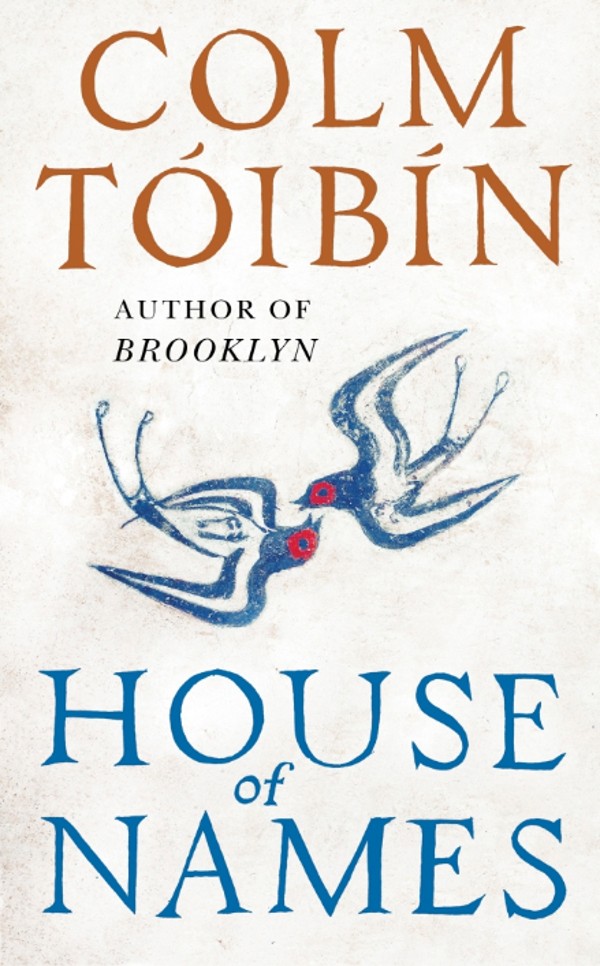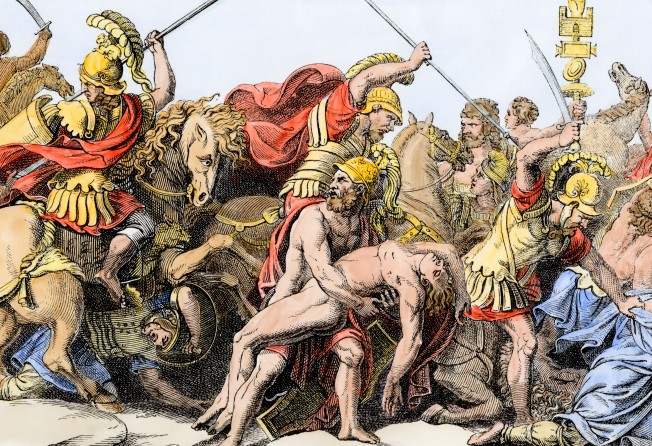
Colm Tóibín explores the war at home in his reimagining of the myth of Agamemnon
While never less than intellectually engaging, Tóibín’s 11th novel doesn’t quite hit a nerve, but his splicing of personal and political feels very timely

House of Names
by Colm Tóibín
Viking
Colm Tóibín’s 11th novel tells a famous story. Agamemnon, a mighty king and warrior, sacrifices his eldest child, Iphigenia, to please the gods and guarantee fair winds to Troy.
On his victorious return many years later, he infuriates his wife, Clytemnestra, on several fronts: not content with murdering their firstborn, he docks with a younger model, Cassandra, on his arm. Agamemnon hardly dips a toe in a hot bath before Clytemnestra cuts his throat, with a little help from her own new squeeze, Aegisthus. The dictatorial couple inspire a civil war, with Clytemnestra’s children at the centre. Her daughter, Electra, picks up the baton of vengeance; her son, Orestes, is booted into exile by an understandably nervous Aegisthus.

Without spoiling Tóibín’s plot choices, he distils the essential details into a story whose concision blocks out extraneous detail: neither Agamemnon’s kingdom nor Troy are named, for example, and little not devoted to the story at hand (Cassandra’s backstory, for example) makes a mark.
Yet traces of the textual uncertainty float about Tóibín’s narration. This isn’t expressed directly with anything so academic as footnotes, but instead is embedded in the preponderance of secrets, stories within stories, and characters prone variously to lies, fantasy and madness.
After Clytemnestra and Aegisthus begin their violent but uneasy alliance, Electra is informed that she must not repeat any of the rumours circulating about their murderous power grab: “[Clytemnestra] wanted all that set aside, as you might a plate of uneaten, unappetising food.” The silence and duplicity required to ensure Agamemnon’s death has emotional ramifications (poor Clytemnestra “has heard enough about it”), and quasi-artistic ones, too. Electra describes the moment her mother welcomed Agamemnon home as “the beginning of a long performance, a performance that started with smiles and ended with shrieks”.
A shared desire to consolidate power entraps the newly minted dictators in a fearful omertà that parodies the imaginative freedom of a literary work: “All day [Clytemnestra] and Aegisthus enacted their fiction. If they could keep us from reminding them of what they did, then they could live in a world of their own invention.”

Leander and Orestes develop a private language, as do Mitros and the old lady. Late-night storms are softened by her meandering stories, seemingly drawn from the Trojan War, which she remakes in her somewhat eccentric telling. As her memory fades, these narratives are reduced to names alone, giving Tóibín’s novel its title.
Orestes’ inevitable ejection from this fecund but fragile paradise is signified by the return of cold, hard truths. The old woman and Mitros die. Leander returns to find his family cowering in a blighted, terrified town, then vanishes to lead rebel forces. Orestes reluctantly re-enters his palace – and the steely embrace of both family and reality.
Reuniting with Electra, he felt “an urgent need to go towards her and embrace her, but he felt a need just as pressing to keep her at bay, as though her presence represented the real world in all its hardness and he preferred to remain in the short, temporary cocoon that had been made for him”.
A degree of irony haunts this perspective: Electra’s profound grief has necessitated her gravitating from a “world of speech and real time and mere human urges” to what she calls an “outpost of the underworld”, inhabited by the ghosts of Agamemnon and Iphigenia.
But why would Tóibín approach such familiar material, and why should we be interested? One answer may be the fluid relationship he traces between the personal and political. Agamemnon literally sacrifices family for the body politic. Clytemnestra’s rage is maternal, but mutates towards self-serving. Her daughter’s murder in the name of superstition persuades her to abandon an already shaky adherence to old world order (gods, rites, blood sacrifice) for material, even existential self-determination. For Electra, this liberation from divine obedience lends her mother “a strange, malignant power […] She dominated the room, yet no one seemed nervous; instead they were exited, fired up, loquacious.”
Clytemnestra’s tragedy is twofold. Having executed her five-year plan of vengeance, she doesn’t leave well enough alone, embroiling herself in a vain bid to consolidate power with the increasingly unsteady Aegisthus. In any case, revenge has damned her to a lifetime’s paranoia. Shortly after killing Agamemnon, she resolves to speak “gently” to her children “in the hope that I could live at ease with both of them now that order had been restored”.
“At ease” resounds uneasily: is Clytemnestra hoping for cordial relations, or (as comes to pass) self-serving freedom from guilt and suspicion – ease of conscience? Her unconscious linguistic uncertainty spreads. Clytemnestra’s desire to control language proves futile as rumours, far wilder than the truth, spread beyond her control.
All this is skilfully handled. Tóibín shifts easily between the precise first person of Clytemnestra’s sections (her careful prose reflects someone who has learned to watch their words) and Orestes’ third person narration – a distance determined, perhaps, by his own distance from the central tragedy. While never less than intellectually absorbing, House of Names’ rather stately grace never quite hits an emotional nerve, save perhaps for Iphigenia’s courage in the face of the ultimate betrayal.
In one sense, Tóibín’s splicing of the personal and political feels au courant: similar themes of deception, duality and treachery fire masterly television series The Americans (began 2013) and The Bureau (began 2015). Grand political narratives cannot escape the urgings of private lives; private lives find themselves swept up by grand political narratives. Modern terrorists obey both the need to dramatise violence, and to transmit their local stories (as is the dying wish of Orestes’ friend Mitros) for a broader audience.
I’m not entirely convinced these themes are contained with Tóibín’s Trojan war-horse. Yet his resurrection of this ancien régime reminds us that these gambits are as old as, well, Greek tragedy itself. The question remains: can we learn from our ancestors’ mistakes? If the past is anything to go by, we know the dismal answer already.